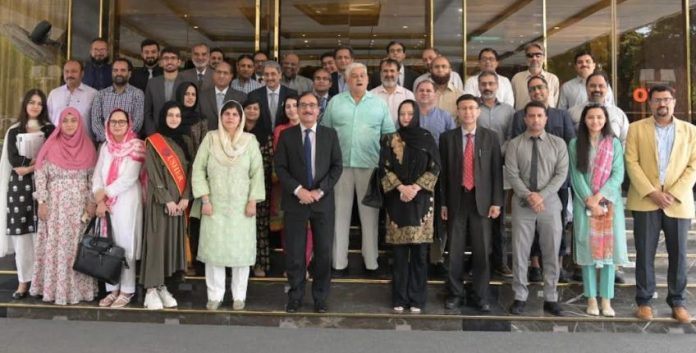In the digital age, access to information and resources is paramount. Prioritizing free access to digital resources and ensuring affordable internet access can bridge the digital divide, unlocking opportunities for education, innovation, and economic growth.
Mahnoor Ansar
Islamabad, OCT 5 /DNA/ – Pakistan, a nation steadfast in its commitment to overcoming economic and governance challenges, is poised to embark on a transformative journey towards sustainable national development. Recognizing the urgency of comprehensive reforms as the bedrock of progress, Pakistan seeks to revitalize its economic outlook, enhance its business environment, and elevate its global trade standing. Dr. Nadeem ul Haque, Vice Chancellor of the Pakistan Institute of Development Economics (PIDE), made these remarks during the opening of the Third Think Tank Moot, hosted by PIDE.
Dr. Shujaat Farooq, Dean of PIDE, provided background on the Think Tank Moot, highlighting its role as a unique platform for esteemed partners and thought leaders to collectively address transformative and sustainable reforms. The Moot fosters the exchange of intellectual capital and actionable strategies, transcending individual efforts to leave a profound impact on policymaking. It will culminate in regular meet-ups, allowing each think tank the opportunity to present their agendas, engage in discussions, and forge a consensus on reform priorities.
The discussions at the event revolved around critical reform areas, with each think tank contributing insights and ideas enriched by innovative strategies and approaches. PIDE’s researchers presented compelling briefings on “Catalyzing Inclusive Economic Growth via Structural Reforms” and “Optimizing Governance for Effective Policy Execution and Impact Evaluation.”
Participants emphasized that in today’s world, having ideas means having access to funds, extending to politics and governance. Financial resources are vital for driving positive change and addressing societal issues. Contrary to common belief, smuggling is not the root cause of economic challenges in many countries; import tariffs often have a more significant impact. Recognizing this distinction empowers policymakers to focus on the real issue and implement appropriate solutions.
To ensure meaningful and sustainable development, a theme-wise reform agenda should be established, tailored to tackle key challenges across various sectors. Public engagement is crucial, as the collective wisdom and diverse perspectives of the people can lead to more inclusive and effective policies.
Inadequate eco-agendas within political parties pose a significant challenge. To address this, individuals passionate about environmental issues must be united. Forming teams of researchers and policymakers can uncover the root causes of environmental problems and develop comprehensive solutions.
Complex societal challenges cannot be solved by legislation alone. Educational reforms hold the potential to shape responsible citizens capable of tackling future challenges. Focusing on educational reforms that nurture critical thinking, empathy, and sustainability is key.
In the digital age, access to information and resources is paramount. Prioritizing free access to digital resources and ensuring affordable internet access can bridge the digital divide, unlocking opportunities for education, innovation, and economic growth.
In conclusion, recognizing the availability of funds for ideas, understanding the impact of import tariffs, establishing a theme-wise reform agenda, encouraging public participation, addressing political parties’ shortcomings, focusing on educational reforms, and promoting free access to digital resources and the internet are crucial steps towards a more prosperous and sustainable future. Together, we can shape a better world for generations to come.
According to the Press Release issued from the PIDE, Islamabad office, following the culmination of the Third Think Tank Moot, a platform for fostering diverse perspectives and innovative ideas, participants from various sectors and backgrounds have united to address the pressing issues affecting Pakistan’s economic development. Under the overarching theme of “Collaborative Reforms for Prosperity,” participants have put forth a Joint Resolution encompassing key themes and actionable steps to guide the nation’s path towards sustainable growth and prosperity.
Representatives from numerous think tanks and universities in the federal capital, including SZABIST, SDPI, PRIED Policy Research Institute for Equitable Development (PRIED), IPS Institute of Policy Studies, POP Council, PSF Pakistan Science Foundation, QAU, Islamabad, IPRI, CDPI Customer Data Platform Institute, PRIME Institute organization, COPAIR Centre of Pakistan and International Relations, ISSI Institute of Strategic Studies Islamabad, IPS Institute of Policy Studies, Pakistan Economic Forum, CRSS Centre of Research and Security Studies, Wealth Pk, Independent News Pakistan, CGR Centre of Governance Research, PMAS Arid University, International Islamic University, COMSATs University participated in the historic event.

















